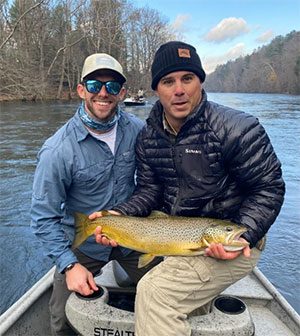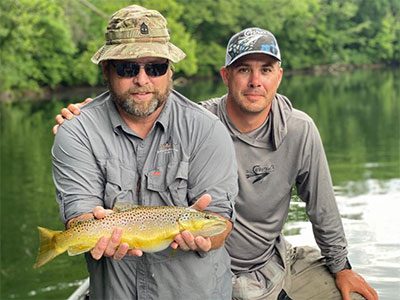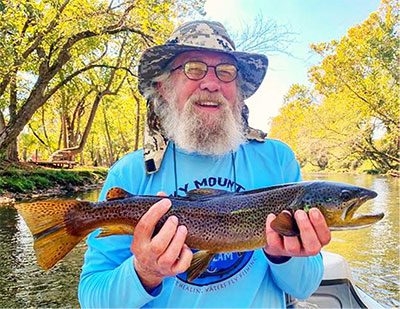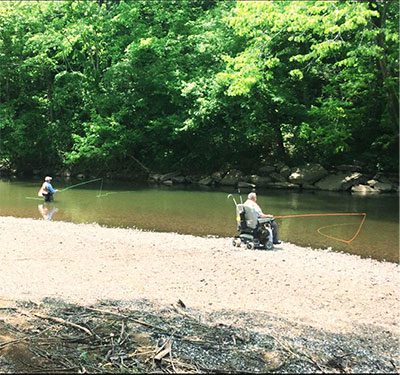Tennessee Valley Stories
 Catching Trout; a Natural Remedy for Treating the Wounds of War
Catching Trout; a Natural Remedy for Treating the Wounds of War
One early TVA goal was to boost regional industrial strength to help bolster national military capacity.
So it’s fitting then that the agency now highly prioritizes recreation on lakes and rivers filled and flowing with curative powers for traumatized veterans of America’s armed overseas conflicts.
Outdoor Recreation: A Rejuvenating Power
The Tennessee Valley Authority has come a long way from the days when recreation potential created by hydroelectric impoundments and man-made reservoirs were mostly an afterthought.
Growing scientific evidence supports widening agreement that outdoor-focused therapies of all kinds can confer great benefits upon those suffering all manner of emotional turmoil, cognitive dysfunction or physical impairment.
“The physiological response to being outside in nature is real, and it’s measurable,” said Michelle Kondo, a research social scientist with the USDA Forest Service. “There are many physical and psychological benefits of nature that scientists have observed, which can better help us understand how nature supports wellness in the body, mind and community.”
“Since scientists have gained access to data sets, sometimes capturing an entire country’s population of medical records and hospital data, we are finding that patient diagnoses and chronic illness risk are often related to where an individual lives and their proximity to green spaces,” she went on. “And that’s a correlation that is likely to strengthen as we conduct more studies.”
 Post-War Water Therapy
Post-War Water Therapy
Project Healing Waters, with chapters all around the country, is an organization specially dedicated to putting struggling veterans in touch with the salubrious effects of nature and connecting them with healthy fishing fellowship among lifelong brothers in arms.
PHW, which partners with the Department of Veterans Affairs and other military health programs and facilities, is attracting more participants and volunteers each year. The organization is particularly active on chilly tailraces of the Tennessee River and clean free-flowing mountain streams of Southern Appalachia.
“Tennessee is a great gem of a place to fish,” said Russ Ambrose, chief Project Healing Waters organizer for the TRV. “There are just so many opportunities and that is one of the reasons why the therapy is so good.”
From tying flies to rod-building to studying insect life and stream biology to learning to cast, mending line, reading currents and ultimately hooking and landing a magnificent healthy fish, the “therapy” is not just the fishing part, but the entire enterprise of fly angling. The sport is a wellspring of hands-on, real-world rehabilitative potential splendidly suited for men and women battling the lasting traumas of war-fighting.
“From my standpoint there is just nothing that beats it for PTSD and dealing with stress,” said Mark Pierce, Southeast regional coordinator for Project Healing Waters. “If you are obsessed with something, or kind of caught in a negative cognitive pattern, nothing is better to free your mind out of that pattern than something new, something novel, something that you can take a deep-dive into that is fun.”

Fly fishing essentially offers veterans a chance to replace their unhealthy fixations with a health obsession, he said.
The sport teaches patience and hand-eye coordination and requires that its practitioners “settle down and focus,” Ambrose explained – which he said is precisely what many veterans need to learn coping mechanisms for dealing with pain, disabilities and mental health challenges.
Ambrose noted that Project Healing Waters is experienced and adept at figuring out how to offer workarounds for veterans with physical disabilities. “Even people who are missing a limb or something like that, we have adaptive devices to take care of that,” he said.
Both Ambrose and Pierce agree that the human interaction and bonding involved with getting together with fishing buddies is also a primary benefit.
“The biggest benefit for everybody is the camaraderie,” said Pierce. “When you get sucked down the fly fishing wormhole, all of the sudden it becomes a learning obsession. And then when you get people together who share the obsession, it turns into a really good time with people laughing and BS-ing and having a good time, and everybody’s got each other’s back and it becomes like a family.”
No Shame in Retreating to the River

Two rivers that plainly fit the latter classification come together in Northeast Tennessee to form Boone Lake – itself a trout-angling waterbody of weighty reputation.
“As far as we are concerned, the Holston River and the Watauga River are the two greatest rivers east of the Mississippi,” said Ambrose.
That’s an opinion typically shared by virtually anybody who’s ever had a good day on either stream. Those with the most firsthand experience on the “Soho” and “Taug” say few places can inspire angling awe in fresh recruits or battle-tested hooksetters alike than amidst the winding, trout-teeming miles of tailwater currents below South Holston and Wilbur dams.
“Both rivers are phenomenal fisheries,” said Anthony Conrad, who runs Conrad’s Guide Service. An Army veteran who served in Iraq, Conrad considers it a personal mission to get men and women with military experience out on the water and help them get fish in the boat, smiles on their faces and happiness back in their lives.
“We cater to a lot of that and try to help out with any kind of veterans programs that reach out to us,” he said. “That’s just where my heart is.”
There is no question that connecting with nature is “absolutely” a therapeutic endeavor for physically challenged and psychologically strained military veterans, he said.
And the socially isolating events of the past two years with respect to the pandemic have been especially difficult for troubled veterans, he added.
Conrad recalls taking out a veteran who not only “had a hard time overseas” but had also lost his mother and father the same week to COVID. Getting that man out on the water and catching brown and rainbow trout rekindled a joy for living that he hadn’t experienced for a very long time.
“Afterwards, he was back to being active and doing things,” said Conrad. “That was a day to remember, for sure.”
Vets Guiding Vets to Guide Vets
Teaching military veterans not just to fly fish but to then in turn teach other veterans to take up the sport is the mission of a group of fly fishing veterans in North Georgia. They have come to recognize the benefits not only that fly fishing itself offers, but also what teaching fly fishing to veterans offers.
“A lot of the younger guys are interested in becoming professional guides because it gives them the opportunity to work outside,” said John Mauldin, chairman of the board of directors for the nonprofit group, Flyfishing Veterans, Inc. “So any of them that have PTSD or other kinds of problems, it gives them the opportunity to be outside and kind of engage people so that the problems that they have been having don’t really affect them.”
Mauldin, a retired psychologist who served in Vietnam, said the key therapeutic element to fly fishing for veterans is that it requires a person to decelerate their thoughts and movements – and the teaching benefits the teacher.
“You have to slow down and take your time,” said Mauldin. “It is hard to fly fish. You have to put your cast where you want to put it, get your drift right, and if it all comes together, then the likelihood of you catching a fish goes up. And if you are pushing it or you are having a bad day, then it goes right through the rod and down your line and the fish can feel it, and they won’t come anywhere near it.”
The fulfillment a guide experiences upon seeing the look of renewal on a veteran’s face after a day on the water is satisfying beyond words, Mauldin said.
“It is like there is just something that has been washed away,” he said. “It is like they are no longer in the future and they are no longer in the past – they are just right there in the present, content in the moment.”
“For us, there is a feeling of giving back – giving back to veterans, giving back to the stream and giving back to trout. That giving-back piece is something just as addictive as catching fish,” he said.

